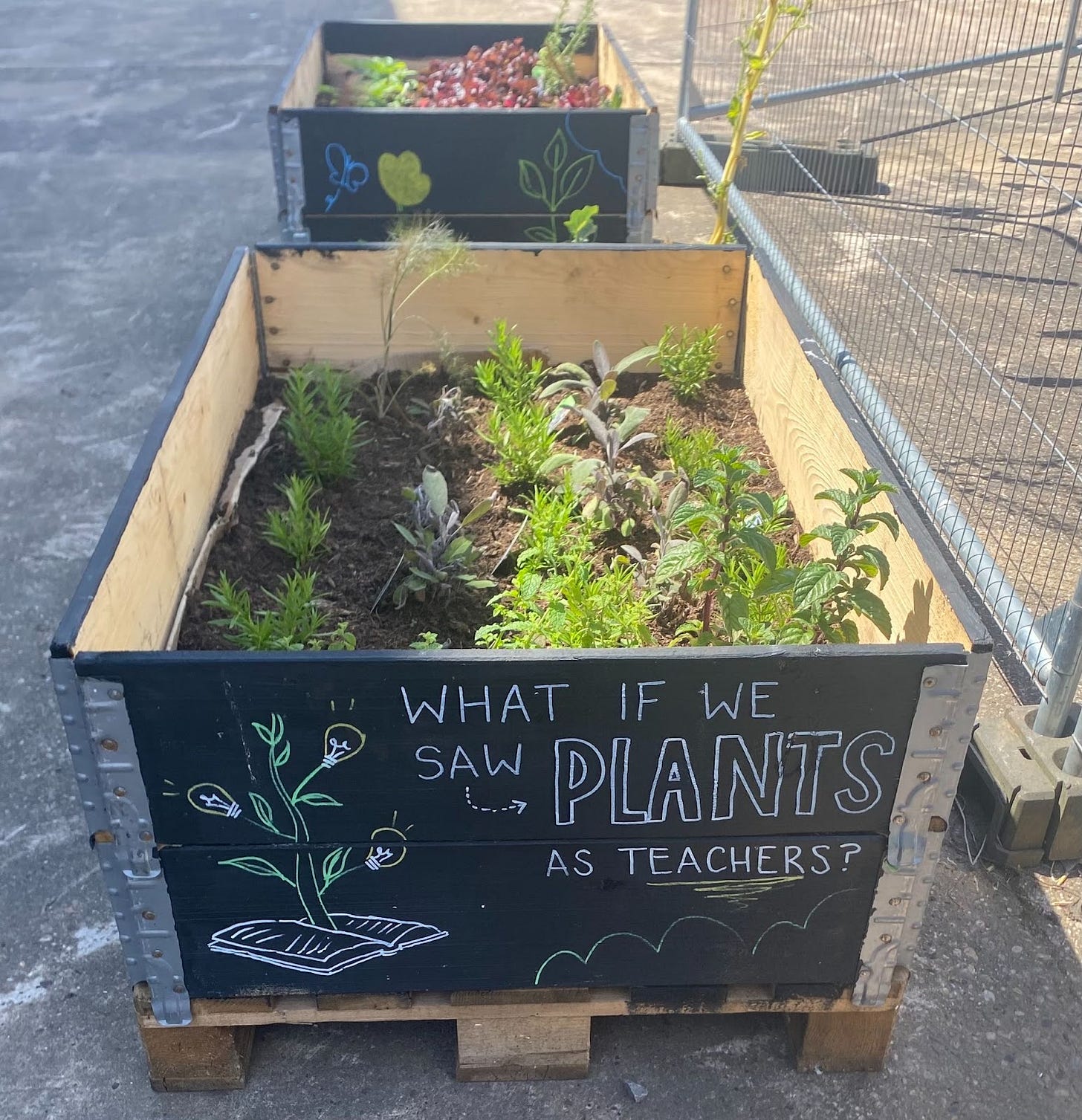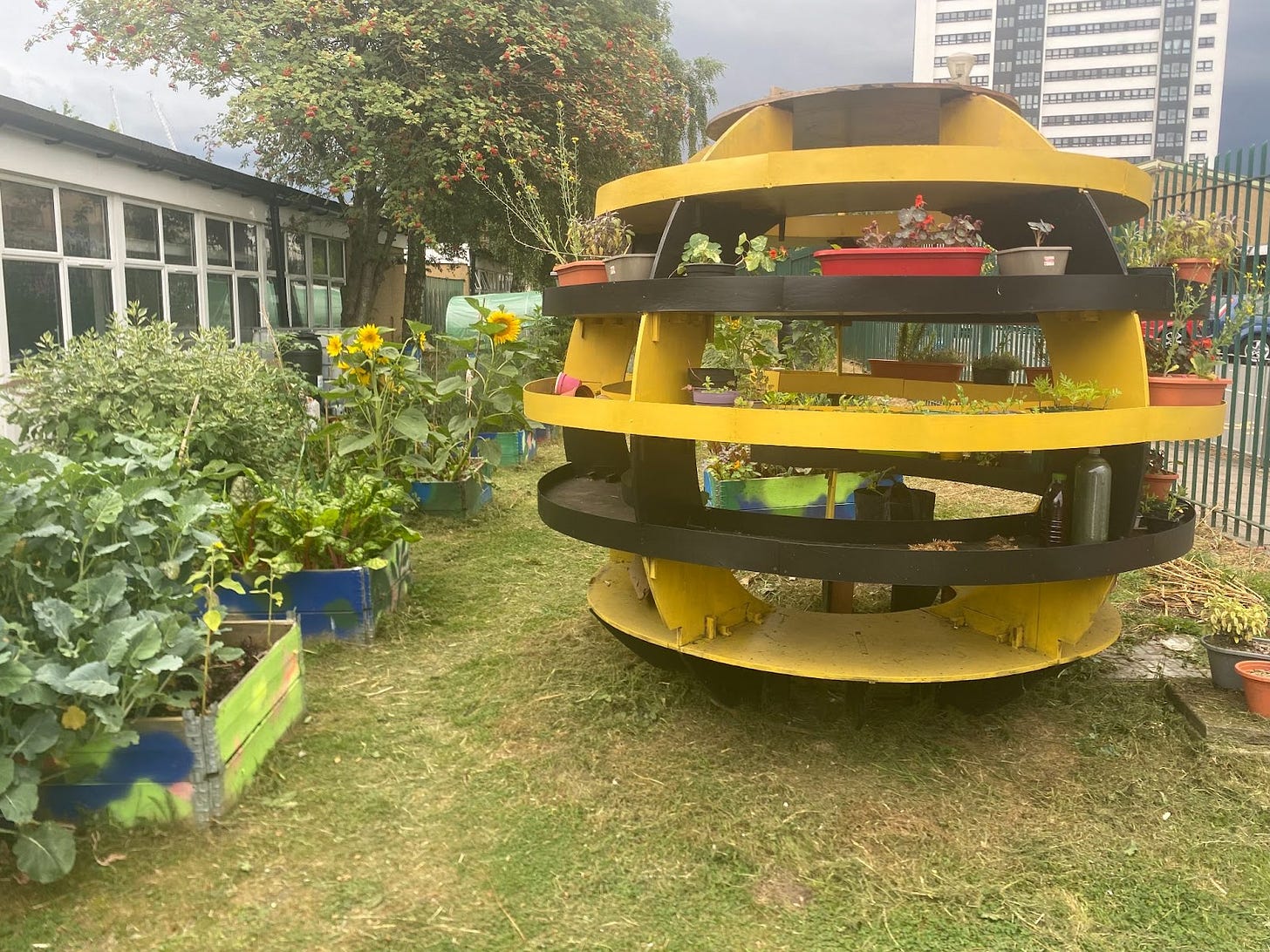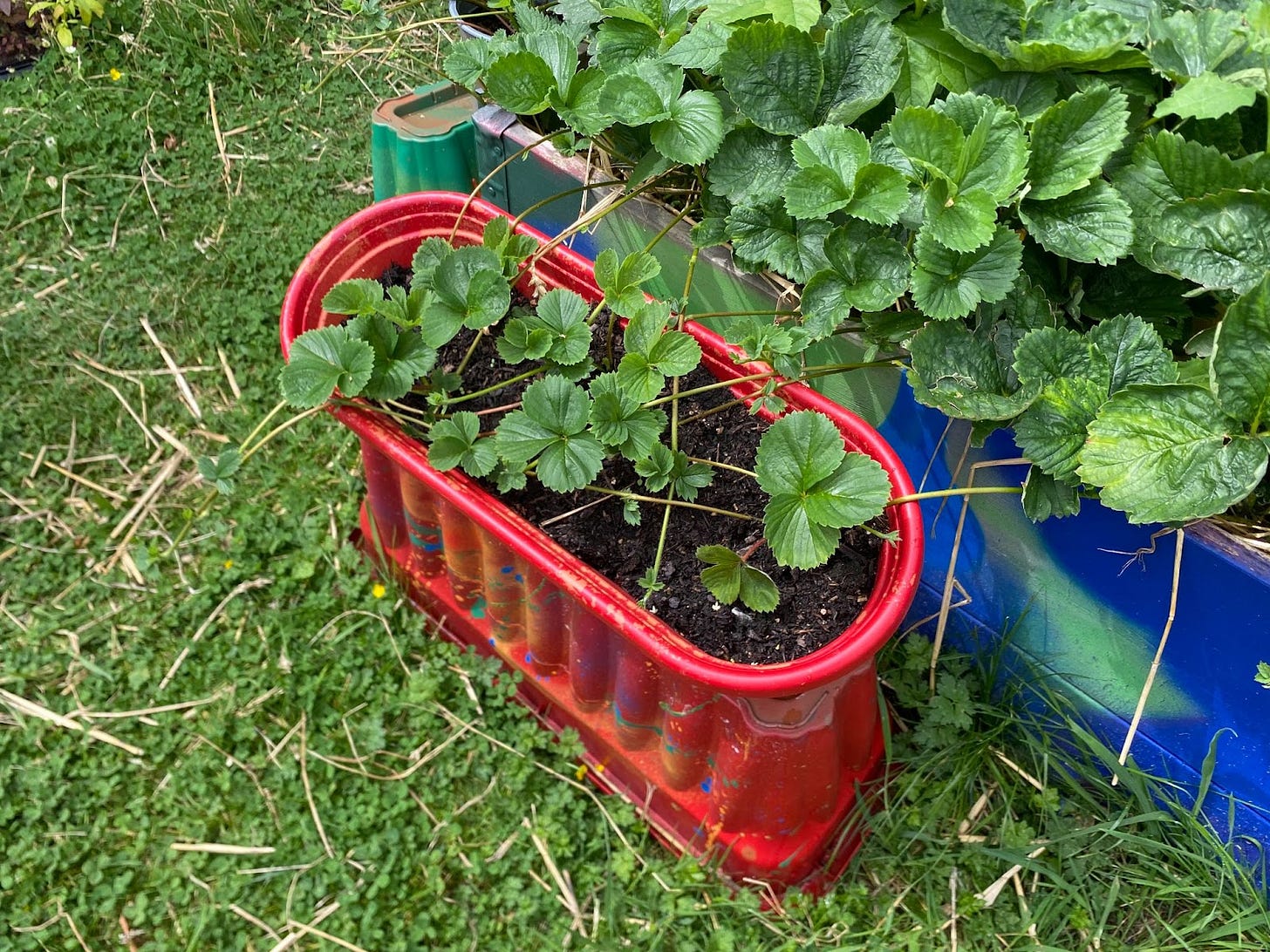Last week I began this series by introducing the Season of Creation as a rhythm in the Christian liturgical season that is designed for the renewal of our relationship with the Creator and all of creation. We also previewed how this series will explore the garden as an expression of and metaphor for what it means to “Hope and Act with Creation,” this year’s theme.
This week, I would like to follow the grow cycle (illustrated below) in a clockwise fashion by considering the theme of planting.
What I am fascinated by and would like to explore here is the way the activity of planting is so intimately related to what we might call a "gift economy."1
Whether it’s saving or sowing seeds, transplanting seedlings into a raised bed or exchanging them at our neighbourhood plant/seed swaps, I have come to see that the way I access and handle plants and seeds disposes me to perceive their giftedness — a kind a treasure that is received in order to be shared, not made by human hands nor earned to be hoarded.
This pattern of gift that permeates the garden has much to teach about the patterns of receiving and giving that we enact in our social relationships, as well. As Robin Wall Kimmerer puts it in Braiding Sweetgrass, "[g]ifts from the earth or from each other establish a particular relationship, an obligation of sorts to give, to receive, and to reciprocate.”2
In fact, in Braiding Sweetgrass I hear a contemporary echo of ancient biblical wisdom passed down by St. Paul:
What do you have that you have not received? And if you received it, why do you boast as if it were not a gift? (1 Cor. 4:7)
In what follows, I would like to share some stories that have seeded my imagination about how we learn from plants — and those elders who have already learned from plants — to flourish by participating in an economy of gifts.
(Portable raised bed with pallet collars for Neighbourhood Doughnut (Economics) Co-Creation Week in 2022)
As a way of leaning into the question, What if we saw plants as our teachers?, I want to ask a sub-question:
“What seeds are you carrying with you?”
This was a question that I received from my friend
, which he posed in the context of a learning journey called Regrowing a Living Culture. As he guided us on this journey, he shared stories, wisdom, questions, and experiences that he had received as gifts that had seeded his own imagination. As he sowed them throughout the course, he also invited us to consider what seeds had been sown into our own lives. In calling them seeds, Dougald was nudging us first to notice and then to have the courage to share the gifts that we had received. After all, history shows that—both in the fields of ideas and in the gardens we tend—humans are the consummate seed-spreaders. At our best, we have learned that seeds are only saved and stored in order to be sown.What seeds are you carrying with you?
When I first heard it, that question really landed with me. It gave me permission to pause and take stock of my ‘seed library.’ It also gave me permission to cultivate the desire to sow these seeds as generously as they had been sown into my life.
So, here are a few garden-related seeds that I would like to share with you.
Overhearing The Good News According to Pam Warhurst & Incredible Edible
One seed of wisdom that I find myself sharing frequently is a word that was spoken by community food activist, Pam Warhurst. Pam is most widely known as one of the founders of Incredible Edible, a network whose vision is “to create kind, confident and connected communities throught the power of food.”3
Pam spoke at our annual neighbourhood summer festival and told the story of how Incredible Edible began when residents in the market town of Todmorden came together to care for a derelict green patch of a public square. Technically, they "guerrilla-gardened" it, which means that they cultivated it without formal permission. Turns out the gamble paid off, as more guerrilla-gardening and formally permitted planting ended up spreading like a rumour.
(BTW: If you are considering whether to do guerrilla gardening or seek formal permission in advance, Pam is fond as saying, "Better to ask forgiveness than permission.")
At the time that Pam gave her talk back in 2022, there were around 150 Incredible Edible projects scattered across the UK and beyond. (And those are just the officially registered ones). When she finished here whistle-stop tour of Incredible Edible-land and the Q & A began, the first question was:
"Pam, this is so inspiring, but the scale of the problems with the broken global food system is so vast, how do we scale up the alternatives that you describe?"
You could hear a pin drop, and without missing a beat, Pam responded:
"You don't. You don't scale community-led food initiatives, you spread them. And you spread by doing them.”
Pam is the best kind of evangelist with a contagiously inspiring energy about her. Listening to Pam get 'evangelical' about the power of food, there was a felt-sense that you were listening to someone who had spent time learning from plants about the power of spreading what is good, true, and beautiful.
I remember thinking if there had been an "altar call" that day, I would have gone forward to rededicate my life to the work of sowing seeds like that one we received that day from Pam.
Learning from a Mother Plant to Become a Mother Gardener
Perhaps the reason that Pam’s wisdom about spreading landed with me was because it gave language to the pattern that I was experiencing through gardens in our neighbourhood.
Flashback to 2020: From January until March of that year I was involved in setting up a share library in B16. We launched the share library on a Saturday in March, and COVID restrictions came into effect on the following Monday. All that community momentum that had been stored up in the run-up to the opening the share library had to go somewhere, and we improvised by moving outside of the share library and doing some “socially distanced” gardening.
Full disclosure: We took a page out of Pam Warhurst’s playbook and decided to do some “guerrilla gardening” with a series of neglected brick planters that had been installed decades ago by the council and were in serious need of some TLC.
By tending those planters on St. Vincent Street, we began to experience the flow of receiving and giving in and around the garden, and how it spreads when humans show up to plant. I can hardly summarize what happened around plants in our neighbourhood during COVID lockdowns, but here are a few headlines:
Surprising friendships happened, like the lockdown “bromance” between Abba (a priest from Ethiopia) and Ray (born and bred in Ladywood, B16).
(Photo: Abba and Ray clearing the planters on a work day on St. Vincent Street)
Plants, seeds and even recipes got swapped.
Cooked meals and snacks were provided for volunteers who were happy to give their time in exchange for “getting paid” with food.
We set up a “plant pipeline” in a vacant polytunnel and offered “home grow” kits to keep the movement spreading.
After having put our flag down on St. Vincent Street, we realised that space and storage was in issue. So, we brokered an agreement with another organisation to establish a lockdown garden by Edgbaston Reservoir. (Please note: we did get permission in advance this time, and they gave us the green light to be what they called "meanwhile users" until they could develop the site after restrictions lifted.)
(Photo: Lockdown gardeners doing their socially distanced “happy pose”)
Back on St. Vincent Street, the planters got the attention of the primary school across the street, and there was an invitation to reboot a garden space that had fizzled out.
When we arrived, one of the staff gave us a tour through a patch of rotting raised beds, empty except for grass and weeds. She said jokingly, "These are our coffins in what looks more like a cemetery than a garden, but perhaps you can bring them back to life?”
With the support of neighbourhood networks and organisations like CIVIC SQUARE, EAT MAKE PLAY, and COMPANIONS FOR HOPE, we did just that. By 2022, we had established a Mother Garden in the front of the school on St. Vincent Street.
(Photo: St. Vincent Street Mother Garden at St. John & St. Peter's Primary School, 2022)
We got the concept of Mother Gardens from fellow gardener/activist, Felipe Molina. He coined the concept (or at least he introduced me to it) as a way of imagining a distributive, mycelial-inspired network of gardens that mimic the garden’s capacity to share resources and to spread its gifts.
Put simply: a Mother Garden could be any garden that “gives birth” to another garden.
In becoming Mother Gardeners, we found ourselves becoming stewards of the garden, as well as its students. One lesson, which became a seed of imagination that I still carry and share, was the experience of observing Marianna lead a workshop on how to propagate strawberries. She showed us how to identify the “runner” from the mother plant and how to root the “runner” into a pot.
From that day on, when I would introduce newcomers to our gardening sessions and explain why we call this a Mother Garden, I would take them to the bed of strawberries where Marianna had led her workshop. I would then riff on Marianna’s show-and-tell pedagogy, saying something like:
In the same way that strawberry plant gives birth to another plant by sending a "runner" this Mother Garden on St. Vincent Street exists to give birth to other gardens. We share seeds, seedlings, soil and skills in order for "runners" to become mother plants, and "volunteers" to become Mother Gardeners.
(Photo: Strawberry mother plants and runners)
Yes, Pam Warhurst was right. Felipe was right. And Marianna was right. What they had in common was that they learned from plants.
Planting is work that is meant to spread, and you spread it by doing it .
Strawberries do it just by being strawberries. We, humans, need lessons and learn by imitation how to become Mother Gardeners —how to become as generous as the strawberry “mother plant” is with the gifts it receives and passes on.
For the Healing of the Nations
Up until now I have been telling stories about how we learn from the activity of planting as a pattern in the garden that shows us what it means to hope and with creation, and not against it.
I want to end with one final story, one more seed that connects what we can learn from plants to a Christian vision for all of creation.
Last Sunday, our parish priest, Fr. John wove together biblical wisdom about the how plants can be the means of God’s plan to renew and heal creation. The homily was brilliant and simple: He brought in one of his favourite medical house plants as his prop to introduce the theme of healing. Then, in retelling the gospel story in Luke 6 of Jesus’ healing of the blind man, Fr. John portrayed the particularity of that encounter between Jesus and blind man as a sign of the cosmic story of God’s intention to bless and heal all of creation. He showed us how that medicinal plant also offers us a sign of the tree of life planted by God, and then retold the scene from the final chapter of Scripture about the tree of life, and the promise that “the leaves of the tree are for the healing of the nations.” (Rev. 22:2ff)
He ended the homily by extending God’s invitation to us for the Season of Creation and always:
How will you receive what plants have to share as gifts in God’s good creation? And in doing so: How might you learn from the plants how to become a generous and healing presence to bless and heal others?
Thanks be to God!
I am using "gift economy” as a placeholder for all the ways that we receive and share gifts (e..g, food, clothing, shelter, artifacts, time, music, experience, presence) that do not come with a price tag, and therefore, in which money is not the measure of value. I will return to this theme in future posts, but for now: if if you are looking for a book-length reflection on gift, etc., I recommend the book that has become a recent discovery for me, Lewis Hyde's, The Gift: How the Creative Spirit Transforms the World https://lewishyde.com/the-gift/
Robin Wall Kimmerer, Braiding Sweetgrass: Indigenous Wisdom, Scientific Knowledge and the Teaching of Plants, p. 25.
https://www.incredibleedible.org.uk/














